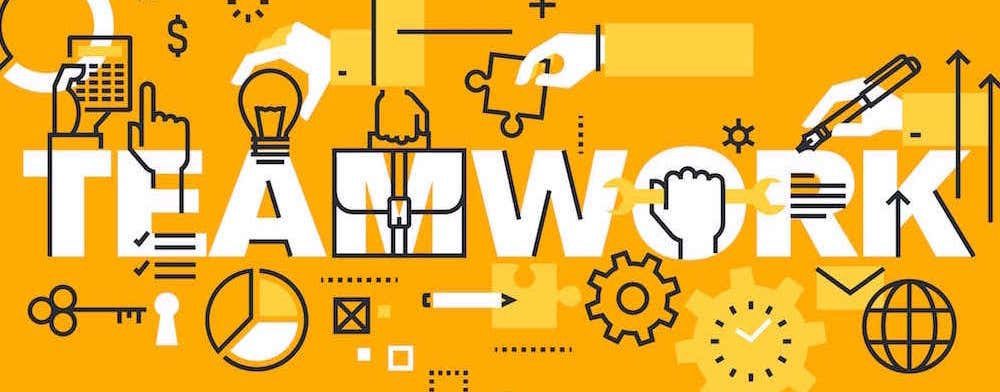0
You have 0 items in your cart

What is the recipe to effective teamwork? Having a well-established team that works together is a must for every business. But how do you get the right team? First, you need the right people.
This is the first step you have to take when trying to establish a core team in your company. The deep roots of one’s attitude are difficult to change, which is why hiring the right people is the key. People who have the right attitude will have a huge impact on the other members of the team. For instance, you can usually tell when someone is having a bad day. You pick up on their vibe and body language. Imagine if you had a team who had this attitude every day. The productivity would decrease and the blame culture would become apparent. When the right team with the right attitude is built, the complaining will turn into cooperation because they have the right perspective on their work and why they are there.
The combined action of a group of people, especially when effective and efficient
 Usually, when people hear the word ‘teamwork’ we automatically think of sports. So what does teamwork mean in a business setting? It’s not that much different. A team in a business setting is a group that supports each other and encourages, similar to a sports team. There are many benefits of having a strong team within the business:
Usually, when people hear the word ‘teamwork’ we automatically think of sports. So what does teamwork mean in a business setting? It’s not that much different. A team in a business setting is a group that supports each other and encourages, similar to a sports team. There are many benefits of having a strong team within the business:
With teamwork, they are able to accomplish more tasks. Accountability doesn’t mean the team blames each other when work isn’t completed. When accountability is correctly utilized, the team feels accountable for the company as a whole rather than the individual jobs.
The ideal situation would be for the various teams work with other teams even if they are not in the same department. Once this happens, imagine the results that will be accomplished. The teams will become aware of their abilities and in turn, will use it to help other departments out.

W.L. Gore & Associates is a great example of companies who value teamwork. They hire people on a project basis. At first, this might come off as surprising, but this way of working has helped W.L. Gore & Associates become one of the most widely recognized companies in the world. People are hired in the general work areas and after they are able to choose which projects they feel fit best with their skills and interests. W.L. Gore & Associates appoint leaders but there isn’t a leadership hierarchy. The employees are also able to form new teams and projects.
Because of W.L. Gore & Associates’ decision to let employees come together and use their creativity, they have become a leading company. They allow collaboration to occur, encouraging people to share their ideas and act on them.
It is important to keep groupthink in mind when collaborating in large groups. Groupthink is when one person dominates the group and the rest of the team agrees so they can be on that person’s good side. Through effective teamwork, there will be a sense of community causing the team to be comfortable with each other.
Coming together is a beginning. Keeping together is progress. Working together is success.

In order to receive the best results, employees must help each other out and work together. Tasks can be completed efficiently and the outcome is far better. But more importantly, teamwork will improve employee relations. It allows bonds to be created. Because everyone is working towards the same goal, it already is a common motivator, which allows the employees to feel like they are part of the same team.
Your team will be spending a lot of time together; this strengthens the bond as well. They learn how to support each other instead of creating unnecessary conflicts. The most important thing that comes from this bonding is the trust and accountability that is built. Once trust and accountability are established, the blame culture and separation will disappear. Your staff will go from a workgroup to a team.

A shared vision creates unity. Without it, your employees are lost and confused on what the company is about and where it’s heading. Having a common understanding of what the company stands for helps bring employees together. They will align with the vision and move forward together at one pace rather than in egotistical multiple directions. A shared vision will give the team something to work towards collectively. It encourages teamwork and collaboration for the greater good of the company.
To create a better everyday life for the many people. We make this possible by offering a wide range of well-designed, functional home-furnishing products at prices so low that as many people as possible will be able to afford them.
IKEA has recognized by having this vision statement, it gives employees a clear direction to develop teamwork. Once a direction is given, employees are able to then create a partnership between the company and vision. But what IKEA has discovered is that this partnership has to go beyond the individual. The vision helps foster teams and the creativity that happens within them.
Establishing core values in a workplace is essential when implementing a teamwork-based culture. Having a foundation built around core values strengthens teamwork. Values, alone, are important because they are the basis for our decision-making. Imagine a team with different values. If that team faced an obstacle, so many different opinions and disagreements would arise. But if there are shared values, they are able to agree on whether or not the decision reflects the values. Values should give your team direction because they can reference it.


Imagine a team that didn’t care about the interpersonal relationships of each other. There would be multiple disagreements and friction. But now imagine you have a team who believe in building positive relationship qualities. Your team must have trust, respect, and understanding. In order to take the first steps towards this, your team has to be in mutual agreement of achieving teamwork instead of just being a group that works in the same environment.
Once a positive relationship is established, your team will be more comfortable collaborating even when there are differences. Those differences will be an encouragement to them to come up with a creative solution.
Teamwork is the ability to work together toward a common vision. The ability to direct individual accomplishments toward organizational objectives. It is the fuel that allows common people to attain uncommon results.
The important thing to remember is every team is built not formed. So where do you begin?
The first step is to create a clear goal or purpose. Without this, your team will be lost. You don’t want your team spending their days trying to figure out what that foggy vision statement means. Teamwork helps your business accomplish something bigger through each individual effort. The reason for their collaboration would stem from the purpose. Your purpose should call the team together and it should hold them together as well.
 No matter what, your purpose must be comprehensible and coherent. Everyone in the team should be able to say, “It’s clear. I see it.” No one should be questioning it or have the sense of wanting to understand what the real meaning behind it is. Once everyone is clear on the purpose, you can move forward to building a team with active listeners.
No matter what, your purpose must be comprehensible and coherent. Everyone in the team should be able to say, “It’s clear. I see it.” No one should be questioning it or have the sense of wanting to understand what the real meaning behind it is. Once everyone is clear on the purpose, you can move forward to building a team with active listeners.
Active listening is an essential skill a team needs. This is a skill that does take practice, but once one has become an active listener, they become an even bigger part of the team culture. It is important to encourage your team to practice this skill.
Can you imagine the productivity and innovation that will happen when your team starts to actively listen to each other? You want your team to start consciously paying attention to what is being said. An active listener will try to figure out the message being sent rather than just the words that are being said.
Once your team starts actively listening and engaging with each other, room for innovation appears. Your team is then able to build off of each other’s ideas. Having the skills to listen is a must when you’re trying to get your company to become innovative. You have to listen to what everyone is saying because it might spark a new idea in your mind.
One of the most important things to keep in mind and stress when improving teamwork is the importance of feedback. A strong team will have strong communication. But where does this come from? Being able to receive and give honest feedback is one of the main factors. Having positive feedback helps increase productivity. Leaders should be recognizing the effort and work being put in. Sometimes, you do need to give feedback that isn’t always as encouraging, but even then, there is a correct way to approach it. You want to create a culture where accountability is where team members are supporting each other. Your team members should be able to critique and give feedback without another team member taking it personally.

Giving feedback sometimes seems easier than receiving it. But this too is important when increasing teamwork. You as a leader or team member should be able to receive feedback as well. Negative feedback should be approached as an opportunity for change or improvement. When trust has been established between team members, they will be more open to ask for help or work with others to overcome the feedback and setbacks.
Through strong teamwork set backs can be approached together and won’t engage in blame culture if something goes wrong. Instead, they will look together and see why the plan didn’t work and what can be done to improve it or make it better.
 An article was written on the negative effect teamwork has on productivity. Is this true? While teamwork is great, it is important to remember everyone’s individual roles. Many times employees will get asked for help on assignments or projects and will prioritize those over their individual projects. You want to make sure your team is aware each individual has their own set of goals and tasks. These tasks will give your team a clear vision of what work needs to be completed. If something isn’t finished, another team member will help due to accountability. Teamwork should be encouraged but you should use it to your advantage and over-rely on it.
An article was written on the negative effect teamwork has on productivity. Is this true? While teamwork is great, it is important to remember everyone’s individual roles. Many times employees will get asked for help on assignments or projects and will prioritize those over their individual projects. You want to make sure your team is aware each individual has their own set of goals and tasks. These tasks will give your team a clear vision of what work needs to be completed. If something isn’t finished, another team member will help due to accountability. Teamwork should be encouraged but you should use it to your advantage and over-rely on it.
Developing teamwork doesn’t stop when you get the right people with the right attitude. You have to continually grow the individuals who make up the team.
It is important to make time for this. It will help your employees take some time to regroup and continue to grow their relationship with each other. These types of activities help teams build problem-solving skills. A crisis in a business can happen at any time, this is why strong problem-solving skills are a must. It encourages your team to take charge and know how to work through it.
 Give Individuals Space to Grow
Give Individuals Space to Grow Strong teamwork will encourage growth with the individuals. It’s important to make sure individuals are happy with their work and feel like they are part of the team. Allowing people to take the time to grow and develop will only improve the team. People can bring what they have learned to the team to help the business benefit.
Your team members should be supporting each other inside and outside of work. They should be celebrating the joys and even setbacks together. It helps increase the level of trust. When there is constant support, your team will start to feel more like teamwork instead of a working group. When people feel support, they are more open to turning to those people for help. Trust and support are essential because it gives people a solid foundation.

Even though you may have a team already built, it is important to continually check up on them. Ask them how they are doing, not with just work but also their life. It is important to show you care because it will motivate them to work hard.
There are a number of tools online that can help you better understand employees’ feelings and behaviors. Personal values assessments can
be found online. You can follow them up with individual interviews. You are then able to see if your company’s core values align with your employee’s core values.
With that being said, you don’t always have to ask your employees to complete an assessment. Even asking the simple question “how are you doing” will suffice. It is important to let your employees know you care about their individual lives. It creates relationships and trust.
Teamwork is an important aspect when it comes to building a business. Can you imagine what your business would look like if you didn’t have a team behind it? Productivity would be low resulting in unfinished work. There’s a lot that goes into building a team. It is important to remember to establish core values and a bigger purpose. Once you have determined what these are, the next step is to hire the right people and begin building the team that will reflect your business’ essence! The most successful and strong teams constantly work to become better.
This Privacy Policy describes how SmartMinds Enterprise OÜ (“SmartMinds”, “we”, “us” or “our”) handles information about yourself that you may provide us with through your use of the Site or Service (“Personal Information”) and should be read along with our Terms of Use posted here, and all other operating rules and additional terms and conditions published on our Site.
SmartMinds is committed to keeping your information secure and managing it in accordance with our legal responsibilities under privacy and data protection laws where we operate. SmartMinds uses your Personal Information only in accordance with this Privacy Policy and Applicable Law. SmartMinds does not sell your Personal Information to third parties. Any capitalized terms not defined in this Privacy Policy are defined in the Terms of Use.
We employ the use of cookies. By using SmartMinds‘s website you consent to the use of cookies in accordance with SmartMinds’s privacy policy.
Most of the modern day interactive web sites use cookies to enable us to retrieve user details for each visit. Cookies are used in some areas of our site to enable the functionality of this area and ease of use for those people visiting. Some of our affiliate / advertising partners may also use cookies.
Unless otherwise stated, SmartMinds and/or it’s licensors own the intellectual property rights for all material on SmartMinds All intellectual property rights are reserved. You may view and/or print pages from https://smartminds.one for your own personal use subject to restrictions set in these terms and conditions.
You must not:
We will approve link requests from these organisations if we determine that: (a) the link would not reflect unfavourably on us or our accredited businesses (for example, trade associations or other organisations representing inherently suspect types of business, such as work-at-home opportunities, shall not be allowed to link); (b)the organisation does not have an unsatisfactory record with us; (c) the benefit to us from the visibility associated with the hyperlink outweighs the absence of SmartMinds; and (d) where the link is in the context of general resource information or is otherwise consistent with editorial content in a newsletter or similar product furthering the mission of the organisation.
These organisations may link to our home page, to publications or to other Web site information so long as the link: (a) is not in any way misleading; (b) does not falsely imply sponsorship, endorsement or approval of the linking party and its products or services; and (c) fits within the context of the linking party’s site.
If you are among the organizations listed in paragraph 2 above and are interested in linking to our website, you must notify us by sending an e-mail to Please include your name, your organisation name, contact information (such as a phone number and/or e-mail address) as well as the URL of your site, a list of any URLs from which you intend to link to our Web site, and a list of the URL(s) on our site to which you would like to link. Allow 2-3 weeks for a response.
Approved organizations may hyperlink to our Web site as follows:
No use of (name)’s logo or other artwork will be allowed for linking absent a trademark license agreement.
Without prior approval and express written permission, you may not create frames around our Web pages or use other techniques that alter in any way the visual presentation or appearance of our Web site.
We shall have no responsibility or liability for any content appearing on your Web site. You agree to indemnify and defend us against all claims arising out of or based upon your Website. No link(s) may appear on any page on your Web site or within any context containing content or materials that may be interpreted as libelous, obscene or criminal, or which infringes, otherwise violates, or advocates the infringement or other violation of, any third party rights.
We reserve the right at any time and in its sole discretion to request that you remove all links or any particular link to our Web site. You agree to immediately remove all links to our Web site upon such request. We also reserve the right to amend these terms and conditions and its linking policy at any time. By continuing to link to our Web site, you agree to be bound to and abide by these linking terms and conditions.
If you find any link on our Web site or any linked web site objectionable for any reason, you may contact us about this. We will consider requests to remove links but will have no obligation to do so or to respond directly to you.
Whilst we endeavour to ensure that the information on this website is correct, we do not warrant its completeness or accuracy; nor do we commit to ensuring that the website remains available or that the material on the website is kept up to date.
We have a 30-day Money Back Guarantee when purchasing Realized Mind, all we ask if that within the 30 days to complete the learning experience and if you truly feel you did not receive any value from the experience we are happy to refund your payment and close your account.
To the maximum extent permitted by applicable law, we exclude all representations, warranties and conditions relating to our website and the use of this website (including, without limitation, any warranties implied by law in respect of satisfactory quality, fitness for purpose and/or the use of reasonable care and skill). Nothing in this disclaimer will:
The limitations and exclusions of liability set out in this Section and elsewhere in this disclaimer: (a) are subject to the preceding paragraph; and (b) govern all liabilities arising under the disclaimer or in relation to the subject matter of this disclaimer, including liabilities arising in contract, in tort (including negligence) and for breach of statutory duty.
To the extent that the website and the information and services on the website are provided free of charge, we will not be liable for any loss or damage of any nature.
